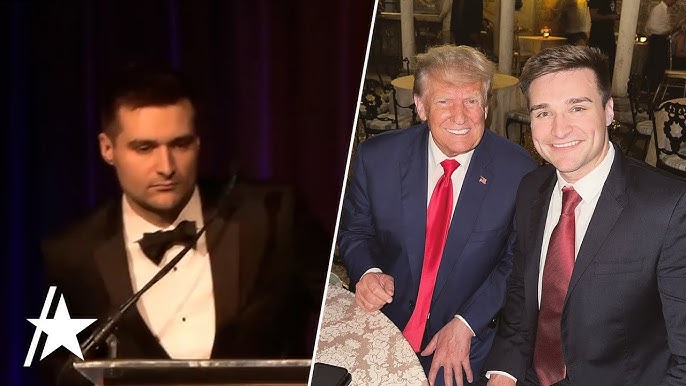On the eve of the anticipated presidential inauguration of Donald Trump, individuals wielding significant influence within right-wing circles reveled with an assortment of pleasures ranging from dance to McDonald’s cheeseburgers. They took delight in illuminating their surroundings with ring lights, capturing images with Elon Musk look-alike cardboard cutouts, and immersing themselves fully into the merry atmosphere. TikTok, a popular social media platform, was the sponsor of this gathering, aptly named the ‘Power 30’ awards, in recognition of the dominant online influence held by these right-wing personalities. The 2024 elections brought victory to the Republican party and Trump, significantly aided by the power of collaborative efforts on TikTok and other digital platforms.
This star-studded event played host to a range of high-profile individuals, podcasters, digital strategists, and social media influencers, all celebrating their triumphs in the landscape of the elections. With an array of digital awards presented to honor their contributions, the atmosphere was charged with the excitement and vigor of knowing they would soon be working under a newly elected Trump administration. Their influence and presence in the 2024 election cycle were undeniable. They made appearances at both Republican and Democratic conventions and embedded themselves into every segment of the election campaign process.
These social media influencers and content creators were not only passively present at rallies and fundraisers but were actively participating, broadcasting their experiences on every conceivable digital channel, amplifying the reach of these events. Behind the screen, they converted their content into hours-long podcasts, promoting and endorsing their preferred candidates relentlessly. Despite the challenges faced by the Trump campaign with fundraising, they made the strategic move of joining forces with popular podcasters to enhance their online presence.
The Trump campaign exhibited a well-crafted strategy of allying with these influencers, particularly appealing to the ‘manosphere’. Throughout the presidential debates, familiar faces could be found in conference rooms that had been repurposed into influencer ‘war rooms’, signaling a shift in political campaigning strategy. Long-standing battles with social media platforms over perceived bias and unjust censorship seemed to reach a turning point with changes in platform governance.
Conservative influencers had been regular critics of social media platforms, alleging biases leading to unjust bans or fact-checks of their content. However, a shift in these dynamics was brought about by changes in platform leadership, such as Elon Musk’s takeover of a lead company, and Meta changing its fact-checking policy under Mark Zuckerberg’s leadership. These changes seemed to pave the way for these creators and influencers to transition from the periphery to the mainstream. As these platforms evolved, influencers began flocking back, reestablishing their homes on these platforms.
Throughout the inaugural weekend, Silicon Valley was alight with a host of creator-centric parties commemorating Trump’s ascent to the White House. One of the most lively among these gatherings was the one sponsored by TikTok, a platform where conservative creators thrived, engaging with their patrons in a dance marathon that lasted for hours.
The eminent Trump campaign advisor Alex Bruesewitz, known for crafting the winning digital strategy of the successful Trump campaign, was honored with a digital contributions award. Prior to joining Trump’s team, Bruesewitz made a name for himself in running X Strategies, a political media agency, working in tandem with upcoming digital-savvy politicians like Matt Gaetz. His expertise in harnessing the power of podcasts to bring Trump’s message to untapped audiences was monumental in Trump’s successful campaign.
The potency of podcasts in providing a peek into the authentic personalities of candidates was a shared belief among the attendees. The sense was that this year was only the beginning of a conservative influencer revolution. All eyes were on the horizon, with ambitious plans to train a greater number of right-leaning creators in the art of political communication aimed at online audiences.
Looking back, there was a pivotal event during the summer aimed at honing the communication skills of more than two dozen conservative influencers. Since as far back as 2019, there has been an active program dedicated to the recruitment and training of at least 400 influencers identifying with conservative principles. These influencers are regularly invited to attend exclusive events that feature speeches from notable figures, enabling networking and collaboration opportunities to boost their online reach.
The future looks promising for these influencers, with plans in place for a line-up of new influencer training events. The impending Trump administration has shown enthusiasm in leveraging these influencers as part of its consolidated media strategy. The defense secretary confirmation hearing was indicative of this approach, with at least two conservative creators present.
As the new week began, some of the creators who significantly aided the digital face of Trump’s campaign were preparing to grace the president’s inaugural events. These occasions not only serve to mark a major shift in the US political landscape, but they also symbolize a broader cultural shift where ordinary individuals possess the proverbial ‘ear of the president.’


